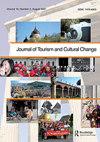A study of the affective motives of city industrial heritage tourists: a case study from Tianjin, China
IF 2.5
4区 管理学
Q2 HOSPITALITY, LEISURE, SPORT & TOURISM
引用次数: 2
Abstract
ABSTRACT Tourism is an important way that industrial heritage can be utilised. Tourism can reduce the economic pressure on the government, allowing it to preserve industrial heritage. The motivation of industrial heritage tourists remains under-researched, and in particular the affective motives. As a result, the development model of industrial heritage tourism in China cannot meet tourists' needs. This study therefore constructs and verifies a measurement model of industrial heritage tourists' affective motives, focusing on the Tianjin Industrial Heritage Site. A quantitative evaluation of tourists' affective motives for visiting the case site is conducted using questionnaire surveys and semi-structured interviews. Both the surveys and interviews used two dimensions of egoistic and altruistic affective motives. The altruistic affective motives of the industrial heritage tourists were generally stronger than their egoistic affective motives. Patriotism was the strongest affective motive and nostalgia the weakest. There were significant differences in the affective motives associated with different types of industrial heritage and tourists with different demographic characteristics.城市工业遗产游客情感动机研究——以天津市为例
旅游是工业遗产利用的重要途径。旅游业可以减轻政府的经济压力,使其能够保护工业遗产。工业遗产游客的旅游动机,尤其是情感动机的研究还不够充分。因此,中国工业遗产旅游的发展模式不能满足游客的需求。因此,本研究以天津工业遗产地为研究对象,构建并验证了工业遗产地游客情感动机的测量模型。通过问卷调查和半结构化访谈,对游客访问案例现场的情感动机进行了定量评估。调查和访谈都使用了利己主义和利他主义两个维度的情感动机。工业遗产旅游者的利他性情感动机普遍强于利己性情感动机。爱国主义是最强烈的情感动机,而怀旧是最弱的。不同类型工业遗产与不同人口特征游客的情感动机存在显著差异。
本文章由计算机程序翻译,如有差异,请以英文原文为准。
求助全文
约1分钟内获得全文
求助全文
来源期刊

Journal of Tourism and Cultural Change
HOSPITALITY, LEISURE, SPORT & TOURISM-
CiteScore
5.10
自引率
9.10%
发文量
31
期刊介绍:
Journal of Tourism and Cultural Change ( JTCC ) is a peer-reviewed, transdisciplinary and transnational journal. It focuses on critically examining the relationships, tensions, representations, conflicts and possibilities that exist between tourism/travel and culture/cultures in an increasingly complex global context. JTCC provides a forum for debate against the backdrop of local, regional, national and transnational understandings of identity and difference. Economic restructuring, recognitions of the cultural dimension of biodiversity and sustainable development, contests regarding the positive and negative impact of patterns of tourist behaviour on cultural diversity, and transcultural strivings - all provide an important focus for JTCC . Global capitalism, in its myriad forms engages with multiple ''ways of being'', generating new relationships, re-evaluating existing, and challenging ways of knowing and being. Tourists and the tourism industry continue to find inventive ways to commodify, transform, present/re-present and consume material culture. JTCC seeks to widen and deepen understandings of such changing relationships and stimulate critical debate by: -Adopting a multidisciplinary approach -Encouraging deep and critical approaches to policy and practice -Embracing an inclusive definition of culture -Focusing on the concept, processes and meanings of change -Encouraging trans-national/transcultural perspectives
 求助内容:
求助内容: 应助结果提醒方式:
应助结果提醒方式:


